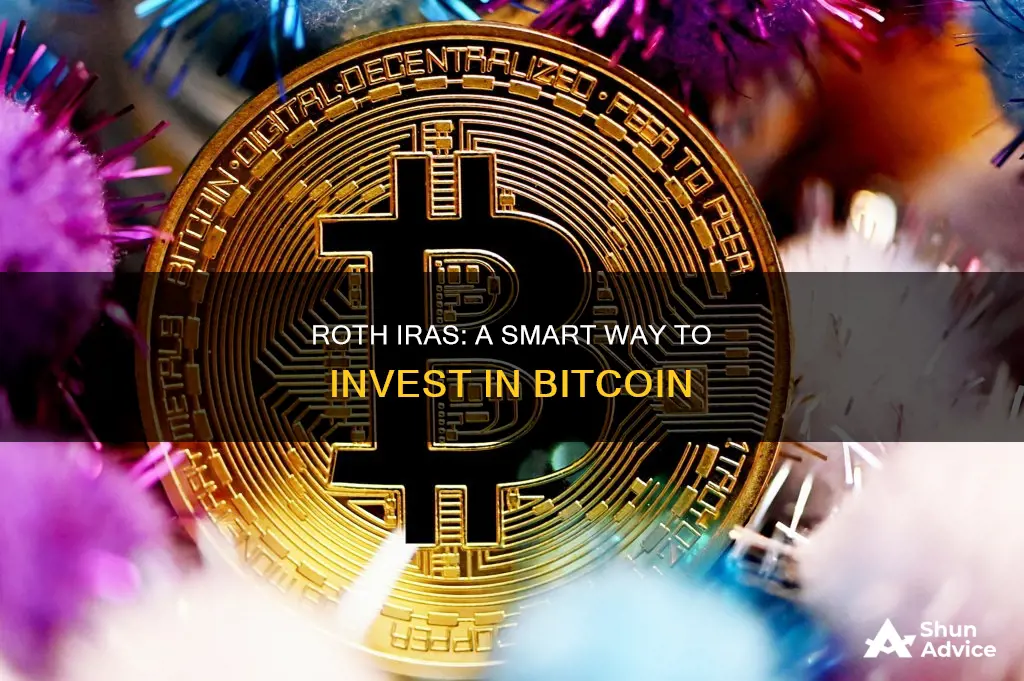
Investing in Bitcoin for retirement is a natural choice for many cryptocurrency fans. They believe in the long-term potential of crypto and understand the substantial risks of holding BTC in the long term. A Bitcoin IRA can provide the tax advantages of traditional and Roth IRAs, but there are additional IRS rules and regulations to consider. While it is possible to hold crypto in a Roth IRA, you cannot contribute cryptocurrency directly to your account. Instead, you must add it by purchasing it.
| Characteristics | Values |
|---|---|
| Can I invest in Bitcoin with a Roth IRA? | Yes, you can invest in Bitcoin with a Roth IRA, but it is not a widely available option. |
| How to invest in Bitcoin with a Roth IRA? | You need to open an account with a niche platform that offers it as an option, such as Bitcoin IRA, Bit IRA, or iTrustCapital. |
| Benefits of investing in Bitcoin with a Roth IRA | Tax advantages, diversification, 24/7 trading, and potential for significant growth. |
| Popular cryptos to invest in a Roth IRA | Bitcoin (BTC), Ethereum (ETH), Litecoin (LTC), and Bitcoin Cash (BCH). |
| Things to consider before investing in Bitcoin with a Roth IRA | Additional fees, crypto exchange limitations, price volatility, and retirement planning complexity. |
What You'll Learn

Bitcoin IRAs
A Bitcoin IRA has the same contribution limits as a conventional IRA: $6,500 for 2023, or $7,500 if you’re 50 or older. In 2024, those limits will be $7,000 and $8,000 if you’re 50 or older. You can roll over funds from an existing IRA or workplace 401(k).
There are three components involved in a Bitcoin IRA:
- Crypto exchanges: These facilitate the purchase and sale of crypto held in your Bitcoin IRA.
- Custodians: All self-directed IRAs use custodians to hold your assets and ensure your account adheres to IRS rules. Bitcoin IRAs have specialized crypto custodians.
- Secure storage solutions: These protect your crypto from theft. Most Bitcoin IRA providers use proprietary secure storage methods.
Advantages of Bitcoin IRAs
- Diversification: Cryptocurrency is not correlated with stocks and bonds, which can help protect your retirement balance, even though crypto prices can be volatile.
- Potential returns: While Bitcoin is volatile, it offers the potential for huge gains.
- Tax advantages: Each time you sell crypto for a profit, you owe capital gains. Buying and selling crypto in a self-directed IRA alleviates this burden as you aren't taxed as long as the money and assets remain in your account.
Disadvantages of Bitcoin IRAs
- Additional fees: Self-directed IRAs typically come with set-up fees, transaction fees, and annual account management fees, which can be very high.
- Crypto exchange limitations: Some Bitcoin IRA companies only allow you to trade on affiliated currency exchanges.
- Price volatility: Market volatility is a substantial risk for crypto, especially for investors close to retirement.
- No tax loss harvesting: You cannot take advantage of tax loss harvesting in a Bitcoin IRA.
- Retirement planning complexity: You cannot invest in traditional securities like stocks and bonds in a Bitcoin IRA, so you will need at least one other account for the balance of your retirement investments.
How to Open a Bitcoin IRA
To open a Bitcoin IRA, you need to locate a custodian to host your self-directed IRA and enable you to make cryptocurrency trades. You will need your full legal name, address, Social Security number, and banking information. Be sure to compare any relevant fees, as these can add up over time and impair your ability to reach your retirement goals.
The Ultimate Guide to Buying Bitcoin for Investment
You may want to see also

Crypto IRA fees
- Setup fees: Some Crypto IRA providers charge an initial setup fee to open an account. These fees can vary significantly, ranging from $0 to a few thousand dollars.
- Transaction fees: These fees are charged for each purchase or sale of cryptocurrency within the IRA. They typically range from 1% to 2% per transaction, but some providers may charge higher fees. For example, BitIRA charges a transaction fee of 5%.
- Custody and maintenance fees: Crypto IRA providers may charge recurring custody and maintenance fees for storing and maintaining your cryptocurrency assets. These fees can vary depending on the provider.
- Trading fees: In addition to transaction fees, some providers may charge separate trading fees for buying and selling cryptocurrencies. These fees can vary depending on the platform and the type of trade.
- Account management fees: Some Crypto IRA providers charge annual account management fees, which can range from a few hundred to a few thousand dollars per year.
- Security fees: To ensure the safety of your digital assets, some providers may charge security fees for measures such as cold storage or multi-signature wallets.
- Insurance fees: Some Crypto IRA companies offer insurance for your digital assets, which may be included in the overall fee structure or charged as a separate fee.
It's important to carefully review the fee structure of any Crypto IRA provider you consider. These fees can significantly impact your overall returns and may even negate the tax advantages offered by IRAs. Therefore, it's crucial to compare fees and understand all the costs involved before choosing a Crypto IRA provider.
Bitcoin Investors: Who Actually Made a Profit?
You may want to see also

Custodians
Some popular custodians that offer Bitcoin investment options within a self-directed IRA include Bitcoin IRA, BitIRA, Equity Trust Company, and iTrustCapital. These firms focus almost exclusively on cryptocurrency investing, so you won't have access to stocks, mutual funds, ETFs, or other traditional investment types.
When choosing a custodian, it's important to compare fees, as these can add up over time and impact your ability to reach your retirement goals. Custodians may charge set-up fees, transaction fees, and annual account management fees. For example, crypto IRAs may charge around 1% to 2% for every purchase and sale, whereas major custodians for traditional IRAs usually don't charge trading fees.
Additionally, some Bitcoin IRA providers only allow trading on affiliated currency exchanges, so if you have a preferred crypto exchange, be sure your chosen custodian allows it.
It's also worth noting that you may need to open multiple Roth IRAs if you want to hold both traditional investments and cryptocurrency. This is because crypto IRAs typically don't allow for traditional investments, so you may need separate accounts to achieve a diversified portfolio.
Before deciding on a custodian, be sure to do your research and carefully consider your investment objectives, fees, and the level of complexity you're comfortable with.
The Ultimate Guide to Investing in Bitcoin
You may want to see also

Crypto exchange limitations
If you're considering investing in Bitcoin or other cryptocurrencies via a Roth IRA, it's important to understand the limitations and potential challenges you may encounter. Here are some key points to keep in mind regarding crypto exchange limitations:
Limited Number of Providers: According to the Internal Revenue Service (IRS) rules, you cannot contribute cryptocurrency directly into a Roth IRA. As a result, only a few Roth IRA providers allow you to purchase crypto within the IRA. This has led to the emergence of "Bitcoin IRAs," which are specifically designed for investing in cryptocurrencies. However, even among these specialised providers, there may be limitations on the crypto exchanges you can use. Some Bitcoin IRA companies restrict trading to affiliated currency exchanges, while others allow you to choose your preferred exchange. Therefore, if you have a preferred crypto exchange, ensure your chosen Bitcoin IRA provider allows it.
Transaction Fees: Crypto platforms often charge transaction fees, typically around 1% to 2% for each purchase and sale. These fees can add up, especially when compared to traditional investment firms or IRA custodians, which usually do not charge trading fees. Additionally, crypto IRAs may have various other fees, such as setup fees, annual account management fees, and custody and maintenance fees. These fees could potentially negate the tax advantages offered by IRAs.
Security and Storage: The highly volatile and unpredictable nature of the cryptocurrency market means that security and storage solutions are critical. Most Bitcoin IRA providers offer proprietary secure storage methods to protect your digital assets. Cold storage and multi-signature wallets are commonly used options.
Limited Investment Options: It's important to remember that a Bitcoin IRA is solely for investing in cryptocurrencies. You cannot invest in traditional securities like stocks, bonds, or mutual funds within a Bitcoin IRA. Therefore, if you're looking for a diversified portfolio, you'll need to maintain at least one additional account for your non-crypto retirement investments. This adds complexity to your retirement planning.
Regulatory Considerations: The IRS has specific rules and regulations governing Bitcoin IRAs, and it's essential to understand them before investing. For example, new contributions to your Roth IRA must be made in cash, and you cannot transfer cryptocurrency you already own into the account. Additionally, the IRS does not review, approve, or endorse investments, and you should be cautious of claims that certain crypto investments are "IRS-approved" or "IRA-approved."
In summary, while it is possible to invest in Bitcoin and other cryptocurrencies through a Roth IRA, there are several limitations and considerations to keep in mind. These include the limited number of providers, transaction fees, security concerns, restricted investment options, and regulatory requirements. Conduct thorough research and carefully evaluate the fees, risks, and potential benefits before deciding whether investing in crypto through a Roth IRA aligns with your financial goals and risk tolerance.
Bitcoin Investment in India: What You Need to Know
You may want to see also

Retirement planning complexity
If you opt for a Bitcoin IRA, you should maintain at least one other account for the rest of your retirement investments. This can add a layer of complexity to your retirement planning. For instance, you might need to open a separate IRA for traditional investments. This is because crypto IRAs typically do not allow investors to hold traditional investments.
Additionally, the process of opening and managing a self-directed Bitcoin IRA is challenging and potentially expensive. It requires several extra steps compared to conventional IRAs, such as finding a custodian who allows cryptocurrency trades and paying various additional fees.
Overall, while investing in Bitcoin for retirement can offer potential benefits, it also introduces substantial risks and complexities to your retirement planning.
Bitcoin: Best Investment or Risky Gamble?
You may want to see also
Frequently asked questions
A Bitcoin IRA is a self-directed individual retirement account (IRA) that allows individuals to hold Bitcoin and other cryptocurrencies within their retirement account.
A Bitcoin IRA offers tax advantages, 24/7 trading, and diversification. Contributions are made with after-tax dollars, and qualified withdrawals in retirement are typically tax-free. Cryptocurrencies are also considered low-correlation assets, which can add diversification to a retirement portfolio.
You can either create and fund a new Roth IRA account or transfer your existing retirement account into a self-directed cryptocurrency Roth IRA. You will need to complete the necessary paperwork, provide identification, and fund your account.
Bitcoin and cryptocurrencies are highly volatile and may not be suitable for someone approaching retirement. Additionally, crypto IRAs typically have much higher fees than traditional IRAs, which could negate the tax advantages.







